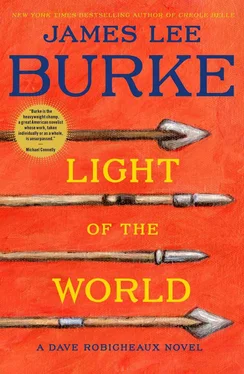In the meantime, I wanted to see Surrette and his minions body-bagged and dumped ignominiously in a potter’s field.
There were light poles on the docks at the marina, and moths swarmed around them and sometimes dropped in the water. Most of the sailboats in the slips were dark, their hulls rocking, their mooring ropes tensing against the chop. The bar had a counter with six stools, and a table where a chessboard had been set up. The bartender looked at his watch when we walked in. He was young and tan, wearing a yellow muscle shirt, probably a swimmer rather than a weight lifter. MYSTERIOUS GALAXY BOOKSTORE, SAN DIEGO, CA was printed on the back of his shirt. “I was going to close a little early tonight,” he said.
“Know a guy named Jack Boyd?” I said.
“He keeps a boat here?” he said.
“I doubt it.”
“I don’t think I know him. What’s the deal?”
“Any pontoon planes land around here?” Clete said.
“Some Hollywood guys flew in for the weekend. They left this morning.”
“You know about the guy who got dragged down the Eastside Highway?” Clete asked.
“Who doesn’t?”
“We’re looking for the guy who did it.”
The bartender looked past us at Gretchen and Alafair. “I don’t want to be rude, but I don’t think you guys are cops, and I don’t know why you’re asking me questions.”
I opened my shield. “My name is Dave Robicheaux. I’m a sheriff’s detective in New Iberia, Louisiana. This is Clete Purcel. He’s a private investigator there. This is my daughter, Alafair, and her friend Gretchen. We’d appreciate any information you can give us.”
There are two pieces of advice I’ve received in my life that I have never forgotten. The first came from a line sergeant who had been at Heartbreak Ridge. My third day in Vietnam, I was ordered to go down a night trail deep inside Indian country and set up an ambush. It was a night trail that was probably salted with Chinese toe-poppers or 105 duds strung with trip wires. The sergeant read the fear and uncertainty in my face the way you read contour lines on a topography map. “Here’s the key, Loot,” he said. “You never think or talk about it before you do it, and you don’t think or talk about it after it’s over.”
The other piece of advice came from a corrupt and thoroughly worthless Teamster official in Baton Rouge, a man whose voice box had been eaten away by cigarettes and whiskey. He said, “It ain’t about money, Robicheaux. It’s about respect. That’s what every workingman and — woman on this planet wants. Anybody don’t know that should have a telephone pole kicked up his ass.”
I gazed up the slope at the orchards blowing in the wind and the two-story house constructed of yellowish-gray stone slabs and the mechanic’s shed and several concrete trailer pads that seemed to be no longer in use.
“Who lives in the stone house?” I asked.
“A lady from Malibu,” the bartender said. “Or she did own it. She used to come in here and stay late, know what I mean?”
“Where is she now?”
“I heard she went back to her husband or something. A lot of California people come out here but don’t stay. We call it the Banana Belt of Montana, but ten-below weather is a hard sell.”
“This isn’t ten-below weather,” Clete said.
“The lady had problems. She’d go off with guys I wouldn’t want to hang with.”
“Which guys?”
“Guys on the make, guys trolling for older women,” he said. “Anybody who’s in a bar at two A.M. has a problem. Know what the problem is?”
“He doesn’t have a home or family to go to,” I said.
Outside the window, I could see the moths fluttering in the electric glow of the light poles and dropping into the water, their paperlike wings dissolving in the black shine of the waves. I could feel my energies draining, my concentration slipping.
“Can I fix you guys something?” the bartender said.
“Do you ever have any revivals or outdoor prayer meetings hereabouts?” I said.
“Funny you ask,” he said. “Some of the migrants have gatherings at that old trailer park there.”
“They’re Hispanic?” I said.
“Maybe the ones who have Saturday-night vespers are. But there’s a bluegrass bunch that really rocks. In winter, I play in a band in La Jolla. I’d like to take a couple of those guys with me.”
I waited, giving him no lead, avoiding any hint of what I wanted to hear him say. I heard Alafair and Gretchen step closer to the counter. “They’re pretty good, huh?” I said.
“When they sing ‘The Old Rugged Cross,’ it’d make an atheist weep.”
I nodded.
“You know the old union song ‘A Miner’s Life Is Like a Sailor’s’?”
“I do,” I said.
“It comes from a song titled ‘Life Is Like a Mountain Railway.’ These guys can really do it.”
“Son of a bitch,” Clete said.
“What did you say?” the bartender asked.
“Not you, buddy,” Clete said. He jabbed his finger at the air, indicating the darkened two-story house down the shore. “That’s got to be it, Streak,” he said. “We take these motherfuckers off at the neck, and we do it now. No thinking about it, no looking back. Full-throttle and fuck it, right?”
“Roger that,” I said.
“Who are you guys?” the bartender said.
“The Bobbsey Twins from Homicide,” Clete said. “You didn’t know that?”
“The what ?” the bartender said.
“Hey, handsome?” Gretchen said.
“What?” the bartender said.
“You’re a nice guy,” she said. “You’ve done your part. We’ve got it covered. We’ll take care of the phone calls. Okay?”
“Yeah, I guess,” he said.
“I like your muscle tone. Maybe I’ll check back with you later. Keep a good thought,” she said. She winked at him.
He looked at her with his mouth open.
Molly and Albert were sitting on the basement floor, their wrists tied behind them with wire twisted around a water pipe. Against the far wall, Molly could see a woman spread-eagled on a box spring, a sheet draped over her body. Behind a boiler, two girls were sitting in a wire cage. They were huddled against each other, their knees drawn up before them. Next to the cage was a ladder extending through a trapdoor in the ceiling. In another corner, she could hear Jack Boyd pouring liquid from a big white plastic jug into one of two washtubs set side by side. When he finished, he set the empty jug on the floor and took another one from a wall shelf. Boyd appeared to be holding his breath while he poured, his face pinched against the acidic stench.
Asa Surrette had come down the stairs twice to look at the woman on the box spring, placing his fingers on her throat to feel her pulse, staring into her face for a long time before returning to the first floor.
Terry came down the wood steps and watched Jack Boyd filling the second washtub. He glanced over his shoulder at Molly and Albert, then looked at Boyd. “Your man up there has a frontal lobe missing,” he said.
“Tell me something I don’t know,” Boyd replied.
“He just told me what we’re doing.”
“You want to give me a hand here?”
“I got sinus problems.” Terry gazed into the shadows behind the boiler. “Jesus Christ, there’re some kids in a cage back there.”
“Get with the program, Terry. Surrette has his own universe. One day he’ll disappear inside it. In the meantime, keep the lines simple.”
Terry lowered his voice and hunched his shoulders, as stupid people do when they don’t want others to hear them. “He told me to get the electric saw out of the closet.”
“Why don’t you say it a little louder so everybody can hear?”
“If I wanted to join the meat cutters’ union, I’d move to Chicago.”
Читать дальше












